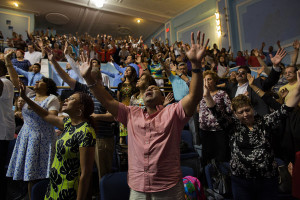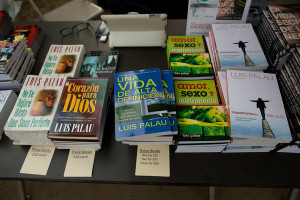You should care about this question if you are a Protestant. Or if you are in human resources in a business. Or if you teach 10th graders. Or if you are from the Honduras. Or if you are a woman. Or if you are a man.
You can stop reading if you don’t fall into any of those categories.
 Every year the World Economic Forum, a non-profit and non-partisan foundation based in Switzerland. issues what it calls the Global Gender Gap Report. The study ranks 136 nations by the disparities between women and men in economics, politics, education and health.
Every year the World Economic Forum, a non-profit and non-partisan foundation based in Switzerland. issues what it calls the Global Gender Gap Report. The study ranks 136 nations by the disparities between women and men in economics, politics, education and health.
Some nations don’t make it because there is not enough data for them. My guess is that the nations that don’t make the list, like North Korea, would probably be towards the bottom. (Of course, maybe North Korea is secretly promoting women throughout its society to ranks of equality. Maybe Kim Jong-un executed his uncle this week in order to put his aunt into a top position of power……Hmm. Yeah, we should go with the first hypothesis).
The World Economic Forum mainly reports the data. It doesn’t attempt to explain the deep-seated forces that explain why some nations are ranked high and others are low. It does not even mention religion anywhere in the report, as far as I can see. But that doesn’t prevent me from bringing religion in to attempt to explain matters. My thought: Protestantism matters.
Curious? Here are nations that have done the best at closing the gender gap, (though no nation has achieved full gender equality):
- Iceland
- Finland
- Norway
- Sweden (ah, those Scandinavians)
- Philippines (what?)
- Ireland
- New Zealand
- Denmark
- Switzerland
- Nicaragua (what?)
And the bottom ten:
- 127. Saudi Arabia (you are not surprised)
- 128. Mali
- 129. Morocco
- 130. Iran
- 131. Ivory Coast
- 132. Mauritania
- 133. Syria
- 134. Chad
- 135. Pakistan
- 136. Yemen
In case you are curious, the United States come in at # 23, just behind Burundi. (What?)
An obvious observation: Islam is not good for gender equality.
A somewhat surprising observation: economic prosperity does not seem to be a deciding factor. One finds the Philippines, Nicaragua, Cuba, Lesotho (!), Burundi, and Ecuador all in the top 25. Meanwhile, South Korea, Kuwait, and Saudi Arabia, all in the top third globally in terms of per capita income, are all in the bottom 25 in terms of the gender gap. Wealthy Japan comes in at #105, right behind Cambodia and Burkina Faso.
So what is the biggest predictor of gender equality?
One could make a decent case for secularism. The Scandinavian nations (which always seem to lead lists like this) are quite secular. And you have that obvious Islamic problem at the bottom of the list. Analysis that stopped here would support a claim that has been made quite regularly within western culture during the last two centuries: public religion is a barrier to liberty. The sooner we break free from religion, the way this thinking goes, the more free, equal and happy we will be.
But if you dig further, that argument does not work so well. Based on this data, I would argue something quite different: the long-term presence of Christianity, particularly Protestantism, is the biggest factor in promoting equality between men and women. I’m thinking like a historian here, which means you have to take into account at least two centuries of development. Profound cultural shifts, such as changes in attitudes, practices and structures related to gender, do not change with a decade or two of new political policies. Over long periods of time, however, nothing closes the gender gap as well as Protestantism. I don’t see a factor that is a better predictor.
Here is what the data says to me: the equity between women and men in the Scandinavian nations is better explained by several centuries of Protestantism than by a few decades of secularism.
Why? No Protestant nation ranked lower than #47 (Jamaica). 13 of the 15 nations that have been influenced by more than a century of Protestantism are in the top 23.
I was actually surprised to see the very modern nation of France ranked as low as it is (45), since France has led the way since 1789 in promoting liberty and equality. It has also been an historic leader in secularism, attempting to break free from public religious influences. However, it only ranks two places ahead of the lowest ranking nation deeply influenced by Protestantism, Jamaica (47).
Meanwhile, we have the following rather secular nations in the bottom half of the list: China (69), Vietnam (73), Slovak Republic (74), Uruguay (77), Czech Republic (83), Japan (105), Albania (108), and South Korea (111).

Filipino Businesswomen: We’re #5
We can also argue for the importance of Christianity, in general, upon gender equality if we compare nations by regions. Christianity has been at work in the Philippines for several centuries. It not only cracks the top 10, but far outpaces more modern and secular nations in East Asia, like China (69), Japan (105), and South Korea (111). At #5, the Philippines also obliterates similar island nations of southeast Asia like Indonesia (95) and Malaysia (102).
In Latin America, the secular nation of Cuba ranks quite high at #15, (a good argument for secularism) behind only Nicaragua. However, the very secular nation of Uruguay ranks at 77.
In post-communist eastern Europe, the quite religious nation of Poland (54) ranks well ahead of its secular cousins, the Slovak Republic (74), Czech Republic (83). I was a bit surprised by this, since both the Czech and Slovak republics had liberal democratic traditions before they, like Poland, were taken over by communism after World War II.
Finally, 49 of top 68 nations were influenced by more than two centuries of Christianity. Only 16 of the bottom 68 were deeply influenced by Christianity – and none of these were Protestant.
Because substantial growth of Christianity if Africa is quite recent, I do not include the sub-Saharan nations of Africa in my categories of Christian or secular nations – except for South Africa, which has had a significant Christian presence for two centuries. But Africa seems to be the wild card in all of this. It will be interesting to see what happens to both Christianity and gender equity in sub-Saharan Africa in the decades to come.
It is important to note that there are all sorts of factors that play into these rankings. I’ve been generalizing quite a bit — cutting with a chain saw, if you will. And one can raise some questions about the methodology of the World Economic Forum, though you’d have to propose an alternative.
At this point, though, if you were a woman who is interested in equal pay for equal work, or equal opportunities for education, or a shot at parliament, or equal health care, I think you would do best to be born in a nation deeply influenced by Protestantism.




